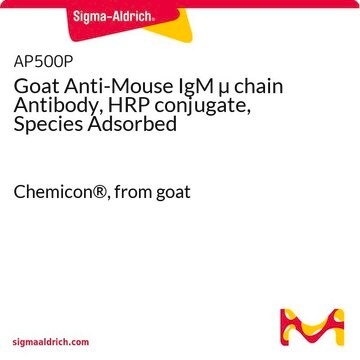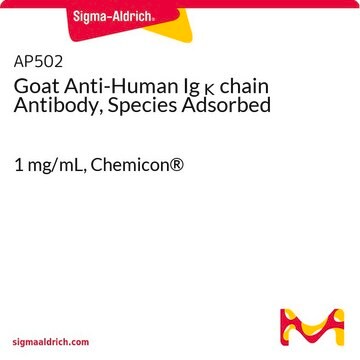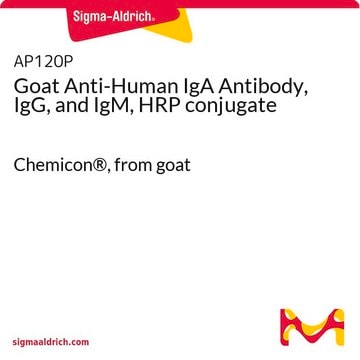AQ502P
Goat Anti-Mouse IgM+IgG+IgA Antibody, F(ab′)2, HRP conjugate, Species Adsorbed
Chemicon®, from goat
Sign Into View Organizational & Contract Pricing
All Photos(1)
About This Item
UNSPSC Code:
12352203
eCl@ss:
32160702
NACRES:
NA.46
Recommended Products
biological source
goat
Quality Level
conjugate
peroxidase conjugate
antibody form
purified antibody
antibody product type
secondary antibodies
clone
polyclonal
species reactivity
mouse
manufacturer/tradename
Chemicon®
technique(s)
ELISA: suitable
shipped in
wet ice
target post-translational modification
unmodified
Related Categories
General description
IgG is the most abundant immunoglobulin and comprises two heavy chains and two light chains. Each molecule has two antigen binding sites. IgG has 4 subclasses: IgG1 (66%), IgG2 (23%), IgG3 (7%) and IgG4 (4%). IgM constitutes about 10% of serum immunoglobulins. IgM (with IgD) is the major immunoglobulin expressed on the surface of B cells. Monomeric IgA constitutes 5-15 % of the serum immunoglobulins whereas dimeric IgA is localized to mucosa surfaces.
Specificity
Reacts with heavy and light chains of mouse IgM, IgG1, IgG2a, IgG2b, IgG3 and IgA. Absorbed for human sera and purified human paraproteins. Minimal cross reactivity with human immunoglobulins.
The antibody reacts with the heavy and light chains of mouse IgM, IgG1, IgG2a, IgG2b, IgG3 and IgA as demonstrated by ELISA and flow cytometry. Minimal cross reactivity with human immunoglobulins.
Immunogen
Epitope: Mouse IgM, IgG, IgA
Prepared from pepsin digest of mouse Ig (H+L).
Application
ELISA: 1:4,000-1:8,000.
Optimal working dilutions must be determined by the end user.
Optimal working dilutions must be determined by the end user.
Research Category
Secondary & Control Antibodies
Secondary & Control Antibodies
Research Sub Category
Fragment Specific Secondary Antibodies
Fragment Specific Secondary Antibodies
This Goat anti-Mouse IgM+IgG+IgA Antibody, F(ab′)2, HRP conjugate, Species Adsorbed is validated for use in ELISA for the detection of Mouse IgM+IgG+IgA.
Physical form
Gel filtration chromatography
Purified by gel filtration chromatography of pepsin digested antibody. Liquid in 50% glycerol/50% PBS, pH 7.4.
Storage and Stability
Maintain refrigerated at 2°-8°C under sterile conditions for up to twelve months from date of receipt. For long term storage, aliquot and store at -20°C. Avoid repeated freeze/thaw cycles.
Legal Information
CHEMICON is a registered trademark of Merck KGaA, Darmstadt, Germany
Disclaimer
Unless otherwise stated in our catalog or other company documentation accompanying the product(s), our products are intended for research use only and are not to be used for any other purpose, which includes but is not limited to, unauthorized commercial uses, in vitro diagnostic uses, ex vivo or in vivo therapeutic uses or any type of consumption or application to humans or animals.
Not finding the right product?
Try our Product Selector Tool.
Storage Class Code
10 - Combustible liquids
WGK
WGK 2
Certificates of Analysis (COA)
Search for Certificates of Analysis (COA) by entering the products Lot/Batch Number. Lot and Batch Numbers can be found on a product’s label following the words ‘Lot’ or ‘Batch’.
Already Own This Product?
Find documentation for the products that you have recently purchased in the Document Library.
Yuliang Wu et al.
Nature protocols, 2(12), 3278-3284 (2007-12-15)
Far western blotting (WB) was derived from the standard WB method to detect protein-protein interactions in vitro. In Far WB, proteins in a cell lysate containing prey proteins are firstly separated by SDS or native PAGE, and transferred to a
John E La Marca et al.
International journal of molecular sciences, 22(23) (2021-12-11)
Tissue homeostasis via the elimination of aberrant cells is fundamental for organism survival. Cell competition is a key homeostatic mechanism, contributing to the recognition and elimination of aberrant cells, preventing their malignant progression and the development of tumors. Here, using
Our team of scientists has experience in all areas of research including Life Science, Material Science, Chemical Synthesis, Chromatography, Analytical and many others.
Contact Technical Service







